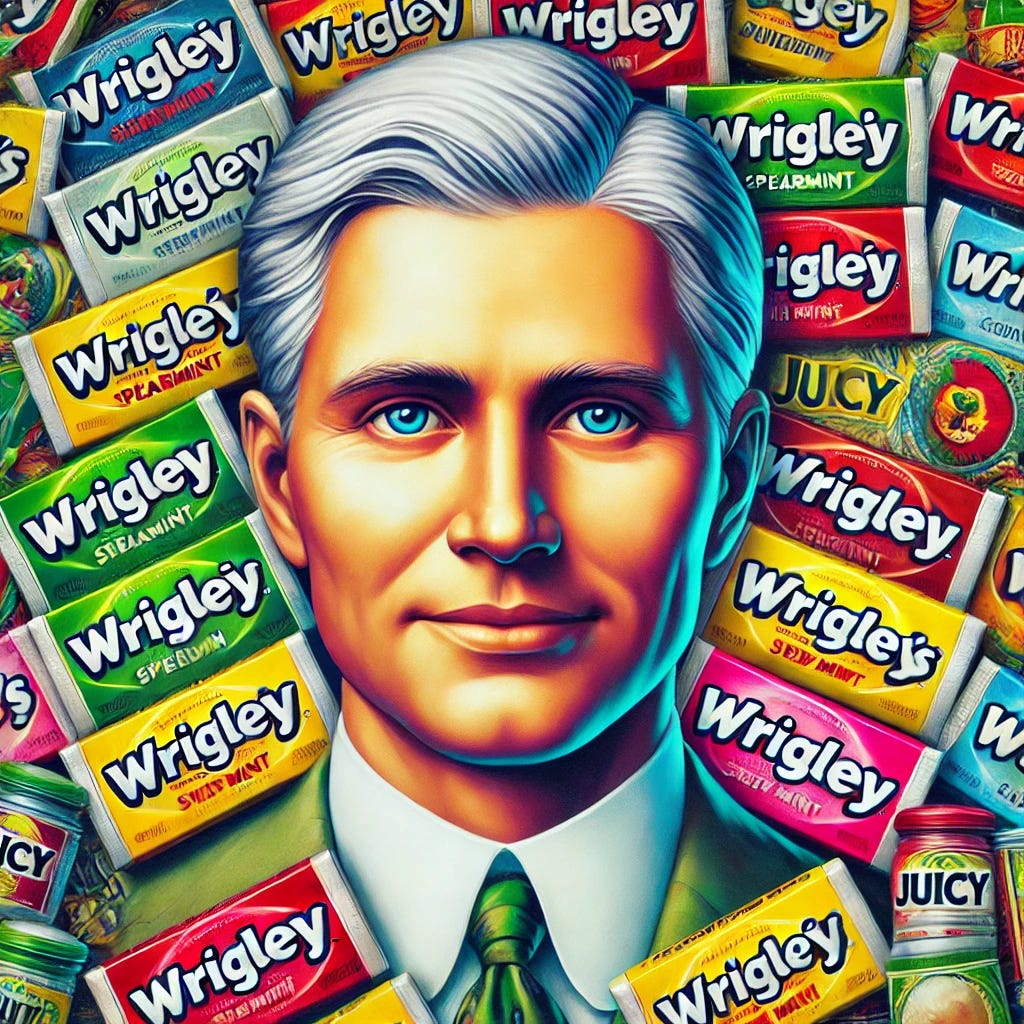The Accidental Empire: How Free Gifts Built Wrigley’s Fortune
It all begins with William Wrigley Jr., born in Philadelphia in 1861. Coming from humble beginnings, Wrigley’s first taste of the business world came from working at his father’s soap company. His entrepreneurial spirit, though, pushed him to start something of his own when he moved to Chicago in 1891 with just $32 in his pocket.
At the time, soap was a standard household product, but it was hardly a glamorous business. Wrigley was determined to stand out. He launched his soap company, selling Wrigley’s Scouring Soap, a brand he aimed to popularize. To entice customers, Wrigley decided to offer a promotional item—something that could sweeten the deal and attract more buyers. The freebie he chose was baking powder, a commonly used kitchen ingredient. His thinking was simple: households might need soap, but adding a practical bonus like baking powder could give him a competitive edge.
But here’s the twist: Wrigley quickly realized that his “gift” was in much higher demand than the soap itself! Customers were more excited about the baking powder than the soap. Seizing on this unexpected feedback, he pivoted his business, switching from soap sales to focus entirely on baking powder. This decision marked the first significant change in Wrigley’s entrepreneurial journey.
However, Wrigley’s genius for promotions didn’t stop there. To sell the baking powder, he began offering yet another free gift: chewing gum. And once again, the gift outpaced the original product! The gum became so popular that it eventually overtook the baking powder as the main attraction. It was as if every turn Wrigley took revealed a hidden treasure waiting to be discovered. By 1893, Wrigley decided to make chewing gum the company’s main product, launching the brands Juicy Fruit and Wrigley's Spearmint, which would soon become iconic.
The chewing gum market proved to be an incredible success. Wrigley’s branding and promotional skills helped push his products into the national spotlight. He flooded the streets with colorful advertising and creative campaigns that made his gum unforgettable. For example, Wrigley was one of the first businessmen to use direct-mail advertising, sending complimentary packs of gum to millions of households in the U.S.
As the gum business took off, Wrigley’s Spearmint became a national sensation, and by the early 20th century, the company was firmly established as a leader in the chewing gum industry. By the time Wrigley expanded globally, the gum business had grown into a massive enterprise, and the Wrigley name was synonymous with chewing gum. His success was further cemented when the company opened factories in different parts of the world, including Canada and Australia.
The success of the gum business was meteoric. The company’s brands became household names, and Wrigley went on to become one of the most successful businessmen of his time. His company would eventually become the largest chewing gum manufacturer in the world. By the time of his death in 1932, Wrigley had left a lasting legacy that continued to grow and thrive long after him.
In the 20th century, Wrigley’s company expanded its offerings, developing new gum products, and even during tough economic times like the Great Depression, sales remained strong. Chewing gum was an affordable luxury for many, and Wrigley had made sure his brand was the top choice. Today, Wrigley’s remains one of the most recognized and successful names in the candy industry, with brands like Extra, Orbit, and Doublemint continuing the legacy that began with a little bar of soap and a savvy marketing twist.
Join us: ➡️ Instagram | Telegram | X ⬅️



